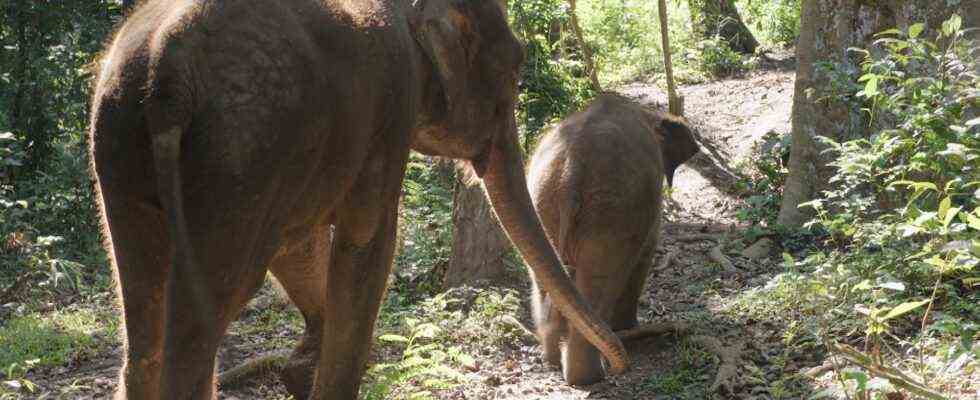World mirror
Status: 10.10.2021 04:47 a.m.
Asian elephants are protected in China. But they make life difficult for the inhabitants of Yunnan Province: in search of food, they attack villages and crops – and nobody is allowed to stop them.
There are now 300 wild elephants living in the forests of Yunnan Province. Once there were only 80 animals, now it is noticeable that the forage plants are scarce in the nature reserve. An employee on the reserve shows a video with 20 elephants bathing in the river, including three cute baby elephants. The offspring are also happy about the gamekeeper Ze De, but he also knows the risks: Hungry elephants threaten the villages and empty the farmers’ fields.
That is why they have set up buffer zones on the edge of some settlements. They call them “elephant canteens”, where extra forage crops are grown, explains Ze De: “We have planted elephants’ favorite plants such as bamboo, banana, bamboo palms and mulberries. Behind the forest there is twice as much area. A total of 26 hectares . ” While the animals are feeding in these “canteens”, the people in the village can get to safety.
Species protection and agriculture in China
Daniel Satra, ARD Beijing, Weltspiegel 7:20 p.m., 10.10.2021
A full-grown Asian elephant needs 200 kilos of food a day. The more animals there are, the greater the pressure on the neighboring villages of the reserve. Because there are no fences: In order to do something against the large animals, they would have to be high and massive – and that would not be species-appropriate.
Gamekeeper Ze De visits friends in a village. All of them cultivate fields and everyone has suffered crop damage. Dao Facang shows a dozen elephants on his cell phone. He had been filming them from a safe distance when he came to his field one morning. “But what can I do, the animals are an endangered species and are protected,” says the villager. The provincial government pays for crop damage – they don’t want to tell us here in the village whether that’s always enough.
Yang Weijie also lives from agriculture, but now relies on plants that elephants are not interested in: “We had to adapt at some point. Now we have tea, rubber and fruit trees. Before that, the elephants came here every day to eat.”
A villager in Xishuangbanna Prefecture shows a video of elephants raiding a field.
Image: Daniel Satra
A camera wall keeps an eye on the elephants
In the capital of Xishuangbanna prefecture, they work in an institute of the nature reserve to protect the villages. Institute director Guo Xianmin shows us a video wall with 600 cameras on a map of the elephant area. “The wild elephants here feel threatened by humans, so they often attack them. This leads to injuries and deaths,” he explains. “In order to inform the people in the villages about approaching elephants, we have set up this warning system.”
The cameras also work at night and the system’s software even recognizes elephants if they are only partially in the photo – one leg, one ear or one buttock is sufficient. As soon as a camera detects an elephant, everyone in the nearby villages receives a warning message on their cell phones. The institute is happy about the success: people are now safer and can avoid the elephants.
Guo Xianmin shows the locations of the cameras in the elephant area.
Image: Daniel Satra
How do you combine elephant protection and citizen security?
However, this will not solve the basic problem, says Zhou Jinfeng from the “China Biodiversity Conservation” foundation in Beijing. “There are four separate elephant sanctuaries in Yunnan. They should be connected so that there is a larger habitat for the animals,” says Zhou. After all, Yunnan is a large province. Giving the elephants more space would guarantee more safety for the people there: “Elephant protection and the interests of the people do not have to be a contradiction in terms.”
People like Zhou Jinfeng think that species conservation needs to be thought and implemented on a larger scale. This is the only way to maintain biodiversity in the long term. The only thing left for the villagers in the elephant areas in southern Yunnan is to continue to be on their guard against their fat and hungry neighbors.
You can see these and other reports on Sunday, October 10th, 2021 in the program “Weltspiegel” at 7:20 pm on Das Erste.

